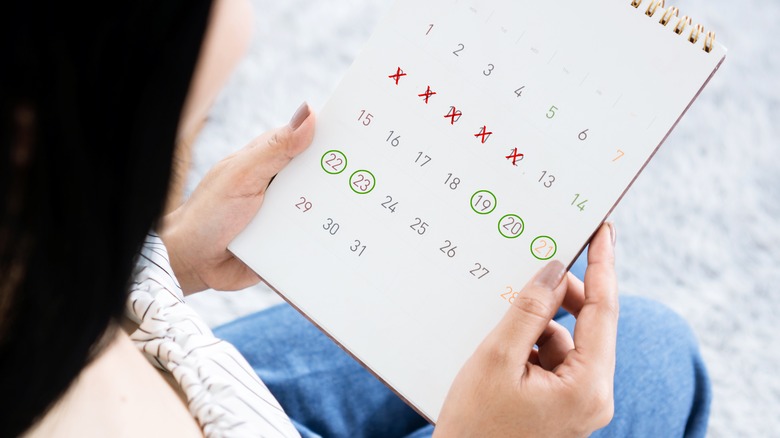Want To Delete Your Period Tracking Apps? Here's How To Track Your Cycle On A Calendar
Understanding your menstrual cycle is an important part of getting to know your body well. There are many proven benefits to tracking your cycle, and now with online apps, it's easier than ever. Digital period tracking has become so popular that millions around the world are using apps to help them stay on top of their cycles.
While using an app is an easy and convenient way to track your cycle, there is a growing concern about how the data can be used against women in today's political climate and with the overturning of Roe v. Wade. With the landmark case's recent reversal, more and more experts are worried about how the data shared on these apps can be used against women seeking an abortion in certain states. To keep your private information safe, you can use the tried-and-true method of tracking your period with a calendar, pen, and notebook.
How to track your menstrual cycle
According to the American College of Obstetricians and Gynecologists, for most women, their period lasts around 21 to 35 days. To start tracking your period by hand, mark the first day of your next period and the end date in your calendar. You can also make more in-depth notes throughout your period. Jot down the days that your period is the heaviest, and note any symptoms (both physical and mental) that you feel throughout your cycle.
You'll need to document at least two periods before you can start looking out for common patterns. Track how long each cycle is by counting from the first day of your period to the day before the next period. Once you know how long your menstrual cycle is, you can better predict the timing of your upcoming ones. You can then use this information to detect a pregnancy and help yourself be better prepared.
The benefits of tracking your period
There are many proven benefits to tracking your cycle that can ease some of the stress and unpredictability of them. According to Elle, tracking your menstrual cycle can help you burn more fat during workouts, get better nights of sleep, and track your fertility with ease. It can also help you pinpoint irregularities in your cycle and become more aware of your body. When you understand what a normal period looks like for you, you can spot changes and report them to your doctor. You'll also be able to spot a potential pregnancy by tracking your dates.
Keep in mind that tracking your period is not a 100% safe method of contraception and shouldn't be relied on to prevent pregnancy. According to Planned Parenthood, fertility awareness programs like period tracking are "about 77-98% effective." Although not a great method of birth control, menstrual cycle tracking is a skill that's worth getting to know.


